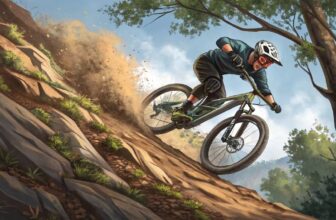Climbing Techniques for MTB
Conquering those hill challenges on your mountain bike is all about nailing the right body posture and adjusting your weight. These things make those scary, steep climbs a whole lot easier.
Importance of Proper Body Position
Getting your posture just right is a game-changer for those tough inclines. When tackling a hill, you gotta shift your position to get the best power and keep the wheels gripping tight. As per Dirt Smart MTB, sliding forward on the seat, with your chest low and weight centered, is the way to go. That setup helps you stay balanced and keeps the front wheel down where it belongs. Trust me, it feels more like taming the hill, rather than fighting it.
| Key Elements | Body Position |
|---|---|
| Steep Climbs | Focused near middle of the pedals |
| Weight Distribution | Front-wheel planted |
| Main Focus | Focused near the middle of the pedals |
Nailing this body position isn’t just about climbing like a pro but also saving that precious energy for the ride ahead. hey, who doesn’t love making those steep parts look easy? For more tips on riding posture, take a peek at our guide on mtb body position.
Weight Shifts and Balance
Shifting your weight can make all the difference, especially when the trail gets bumpy. Pushing the weight forward when the front end is lifting up helps keep you in that “power position”. This move makes sure the weight on your bike is smartly balanced.
Here’s what to remember: bring your chest down when inclines go seriously steep to avoid those awkward and unpredictable wheelies.
| Climbing Scenario | Weight Shift Technique |
|---|---|
| Elevated front wheel | Lean into it, weight up front |
| Steep inclines | Drop that chest low |
Also, a common mistake? Yanking too much on the handlebars. Doing that can send you into unwanted wheelies and can kill your grip. Instead, use ’em to steer, and let your legs do the heavy lifting on the climb.
Getting to grips with these body positions and weight shifts can really boost your mountain biking fun. You’ll be taking on those gnarly climbs with ease and style. Want more climbing wisdom? Check out our pieces on mtb trail ratings and mtb climbing techniques.
Advanced Climbing Strategies
Conquering mtb technical climbing ain’t just about pedal power—it’s about employing techniques that’ll make you the king (or queen) of the hills. Let’s get into the nitty-gritty of forward positioning and standing climbs.
Forward Position on Steep Climbs
Leaning forward might feel awkward, but it’s crucial when you’re staring down a steep, rocky path. Imagine sitting on your bike like you’re ready to take off in a race, chest low, and body weight firmly over the center of the bike’s heartbeat—yep, that bottom bracket area.
| What to Do | How it Helps |
|---|---|
| Lean Forward | Keeps you stable and powered up |
| Center Weight | Ensures balance and traction |
| Tiny Adjustments | Maximizes balance, keeps you upright |
Pro riders know that even teeny weight shifts can make or break your climb. Those little tweaks keep your ride smooth and constant, especially when the trail’s throwing rocks and ruts at you. Oh, and don’t forget to check your mtb tire pressure before heading out.
Getting Out of the Saddle
When the climb’s so steep you feel like gravity’s your nemesis, getting out of the seat where it’s at. This tweak helps you keep control of the bike, especially up front, so you’re not kissing the trail when you should be reaching for the skies.
| Move | Why it Rocks |
|---|---|
| Stand Up | Keeps the wheels on the ground |
| Hands Low | Perfect balance of upper and lower body |
| Get a Grip | More control, less face-planting |
With your chest low, it’s like a dance between your upper and lower halves, perfectly synced for keeping things steady. No unintentional catapulting, just good steering and smooth sailing. Tweak your mtb suspension setup to make sure it’s ready for whatever wild climbs you find yourself tackling.
For more juicy tips on handling obstacles smoothly and getting the lowdown on making climbs easy, dig into our related articles on mountain biking skills and gear.
Dynamic Movements and Adjustments
Speeding Up for Momentum
Getting your bike moving quickly is a game-changer when tackling MTB technical climbing. When facing those daunting steep climbs, leaning forward helps keep your balance and prevents those unplanned wheelies. It’s all about mastering the art of shifting your weight on the saddle and dropping your upper body for those gnarly ascents.
| Steep Climb Tips | What to Do |
|---|---|
| Keep It Moving | Speed up the bike |
| Stay Balanced | Lean forward, adjust the weight on the saddle |
But hold on – where you put your weight matters too. Lean into it a bit and keep that rear wheel grounded for grip. For extra tips on positioning yourself just right, head over to our piece on MTB body position.
Mastering Tough Climbs
Those tricky climbs with rock ledges, slippery patches, and other obstacles need some slick moves. Here’s how to deal with them:
- Posture Matters: Get your body position right. Relaxed elbows mean you’re ready for bumps without a hitch.
- Shifting Weight: Move your weight back and forth as needed to keep on top of things.
- Pedal Like a Pro: Smooth and steady pedaling keeps the bike moving. Too much power too fast, and you’ll be slipping all over.
- Control Your Speed: Keep it even and steady to glide over obstacles with ease.
| Technique | What to Do |
|---|---|
| Posture | Keep elbows bent, chill out |
| Weight Shift | Move forward or back as needed |
| Pedal Action | Nice and steady strokes |
| Speed Control | Keep it smooth and steady |
Need tips on how to lean and stay balanced? Check out our article on mtb cornering techniques.
Keeping your mtb tire pressure just right and your mountain bike maintained can make life’s climbs a lot easier. And don’t forget to pick the right mtb gear ratios for whatever track you’re tackling. Dive deep into our guide on diy mountain bike repairs for some hands-on advice.
These pointers and skills are key to nailing those tough climbs, making sure your ride is both a thrill and less of a spill.
Key Factors for Successful Climbs
When it comes to climbing on your mountain bike, getting the hang of balancing your weight and handling those pesky obstacles is your golden ticket to success. Let’s break down what you gotta keep in mind to amp up your biking prowess.
Weight Distribution and Traction
Nailing the right riding position is everything if you’re aiming to conquer those steep climbs like a boss. Steep hills and tricky hurdles, like erosion and rocks, put your skills to the test. Using the correct posture doesn’t just help you tackle these tough climbs – it also saves your energy for that post-ride snack.
Balancing and staying grounded through proper weight shifting is what makes the magic happen. Especially when the front of your bike starts to rise, leaning forward into this “power stance” is your best bet. This helps keep your wheels in check, avoids making an unintentional acrobat out of you, and keeps control in your hands.
Peep this quick rundown on tightening up your weight shifts and grip on the ground:
| Technique | Description | Benefit |
|---|---|---|
| Shifting Weight Forward | Lean towards the handlebars on uphill | Keeps those wheels glued to the dirt |
| Lowering Chest | Bring that torso lower on intense climbs | Deters those unwanted wheelies |
| Dynamic Adjustments | Stay loose, constantly tweak your weight | Boosts stability and control |
Want more wisdom on getting your posture just right? Check out our thoughts on mtb body position.
Handling Obstacles Smoothly
Taking on steep, gnarly trails asks for a bit more action and finesse compared to cruising easier paths. Stuff you learned on road bikes might not hold up here. Strategies like keeping your chest low and staying balanced are key to clearing those speed bumps effectively.
Here’s how to handle the rough stuff with ease:
- Reading the Terrain: Keep those eyes peeled for upcoming bumps and lumps.
- Maintaining Momentum: Being steady with your speed lets you glide over minor obstacles.
- Correct Gear Usage: Manage your gear shifts to keep your rhythm steady (mtb gear ratios).
Here’s a small table on tackling obstacles:
| Obstacle | Technique | Benefit |
|---|---|---|
| Rocks | Chest low, adjust weight | Dodges unwanted bike-flipping |
| Erosion Ruts | Pick the smooth path, keep it moving | Less chance of getting snagged |
| Loose Gravel | Easy on the gas, distribute weight well | Stops slipping or losing grip |
Using these tricks, you’ll manage obstacles with flair and level up your climbing game. For more nifty tips on hiking up those skills, swing by our mountain biking basic skills.
By getting a grip on these key points, you’re setting the stage for an epic mountain biking showdown with yourself. Whether you’re just starting or already know your way around a trail, remembering these will have you riding like a champ. Want more info on tough terrains? Check out our write-ups on riding rock gardens mtb and MTB trail ratings.
Climbing Challenges and Solutions
Mountain biking lovers know there’s a special set of hurdles when heading uphill. Two pesky problems often arise: losing traction and unexpected wheelies. But don’t worry, there’s a way to tackle this head-on.
Overcoming Slippery Spots
When climbing, keeping your wheels stuck to the ground gets tough, especially on surfaces that are slick. To conquer this:
- Mix Up Your Pedaling: Don’t just pedal like a machine. Change the power you apply to match the terrain—keeps you gripping the ground better.
- Gentle Pedaling on Slick Surfaces: Ease up on that pedal over wet or loose ground to stop the wheels from going for a spin.
- Find Grip Hubs: Spot those solid patches like rocks or packed dirt for your tires to bite into.
- Body Balance Trick: Adjust your weight, whether leaning a bit forward or back, to maximize your grip on different terrains.
Want more detail on climbing like a pro? Check out our section on mtb body position.
| Technique | What’s It Do? |
|---|---|
| Power Shift | Tweak your pedal power with terrain |
| Gentle Spin | Easy pedaling on slick bits |
| Grip Hunt | Find those traction-friendly spots |
| Weigh In | Shift your weight for better balance |
Dodging the Accidental Wheelie
Now, when it comes to steep climbs, wheelies can be a sneaky foe, but adjusting how you hold yourself on the bike can help:
- Lean Forward: Slide your bum toward the front of your seat to keep those front wheels down.
- Tuck in Your Chest: Bring your chest nearer to your handlebars to squash those pesky wheelies.
- Stand When It’s Steep: On challenging climbs, getting up from your seat transfers your weight where it’s most needed for traction.
- Stay Balanced: Keep yourself steady. The right posture aids in applying power smoothly and dodging any unwanted wheel lift or wobble.
For more tips on keeping your weight and body in check, have a look at mtb line choice.
Quick Tips for No-Wheelie Technique
| Move | What’s It Fix? |
|---|---|
| Lean Forward | Keeps the front wheel down |
| Chest Tuck | Stops front-end lift |
| Stand Up | Redistribute weight on sharp climbs |
| Balance Town | Align yourself properly for control |
With these tricks up your sleeve, you’ll be tackling those tricky climbs without a hitch, holding onto traction, and controlling wheelies like a pro. For more on mtb gear ratios and other expert tips, dive into our thorough guides.
Technique Adaptations for MTB Climbs
Shifting Weight Forward
Keeping the right body position is super important for climbing hills on a mountain bike, especially when the trail gets steep. Sitting forward on the seat makes all the difference. You want your chest low and your weight pressing down just right over the pedals for maximum power. Even tiny shifts in your weight can affect balance and control big time.
The trick is to be centered but a bit forward so your front wheel stays put—it’s common for it to lift off the ground on steep slopes if you don’t. This helps keep the back wheel gripping the track, cutting down on those annoying spin-outs. To really get it down, check out our article on mtb body position.
| Climbing Aspect | Technique |
|---|---|
| Position | Over pedals to the back wheel |
| Weight Distribution | Over pedals to back wheel |
| Balance Adjustment | Tiny, constant shifts for steadiness |
For more on how to distribute your weight effectively, hit up our article on mtb weight distribution and traction.
Avoiding Handlebar Mistakes
Grabbing the handlebars right is essential for climbing tricky trails. A big no-no is yanking on the bars with every pedal. Doing this can easily make your front wheel pop up and mess with your traction.
The aim? Use the bars for steering and keeping the bike steady—not for power. Keep a light hand on the bars and really dig in with your legs for the climb. Using the handlebars for cleaning through tough sections helps with control.
Here’s what to do:
- Steer and balance with the bars, not pull.
- Keep a gentle, continuous grip, and avoid sharp tugs.
- Pump those legs for smooth, steady pedal strokes.
For deeper dives into technique, visit our page on mtb handling and control.
| Handlebar Technique | Do’s | Don’ts |
|---|---|---|
| Grip | Gentle, even | Rough, harsh |
| Usage | Balancing and steering | Tugging for power |
| Pedal Strokes | Steady and powerful | All over the place |
By following these tips, riders can boost their climbing skills, avoid common mistakes, and keep on track. For more help on control, see mtb cornering techniques.
Check out more on mountain biking basic skills to up your game even further.
Specific Techniques for Mountain Biking
Dynamic Moves on Tricky Trails
Riding up steep, gnarly paths on a mountain bike ain’t a walk in the park. It calls for some serious skill and the right moves. There’s no playing around like on a lazy road ride or an easy trail. Here are the moves you gotta nail:
- Weight Swaps: Keep shifting forward, especially when that front wheel’s up in the air. This way, it keeps you steady. Hugging that handlebars on those gnarly climbs makes sure you don’t pop a wheelie when you least expect it.
- Rider’s Stance: Planting yourself in a strong, confident posture while pedaling can make the difference between tanking the hill and cruising up like a pro. It spreads out your weight and keeps you going without burning out.
- Obstacle Maneuvering: Tackling mud trenches, boulders, or buried tree roots is all part of the game. Twists and turns of your body and bike are the name of the game for a clean climb.
Tackling Steep and Techy Paths
Face it, those wickedly steep trails are a real test. Here are a few tricks to handle ’em like a boss:
- Frontward Lean on Crazy Climbs: When the slope’s almost vertical, hopping off the seat helps the rear tire dig in while dodging bumps. It does zap more energy, but you get a better grip and don’t spin out.
- Keeping Balanced for Grip: Balance is everything! Making sure weight’s spread between the front and back keeps you from losing it and helps the tires grip tight over steep parts.
- Obstacle Handling: Rocks and roots in your way? Precision’s your best buddy. Juggling weight shifts lets your tires keep hugging the trail, making every move count for control and grip.
Wanna dive deeper into tackling all sorts of paths? Check out our pieces on mtb body position, mtb braking techniques, and riding rock gardens mtb. Get these moves down and no hill, no matter how beastly, will stand a chance against you.




